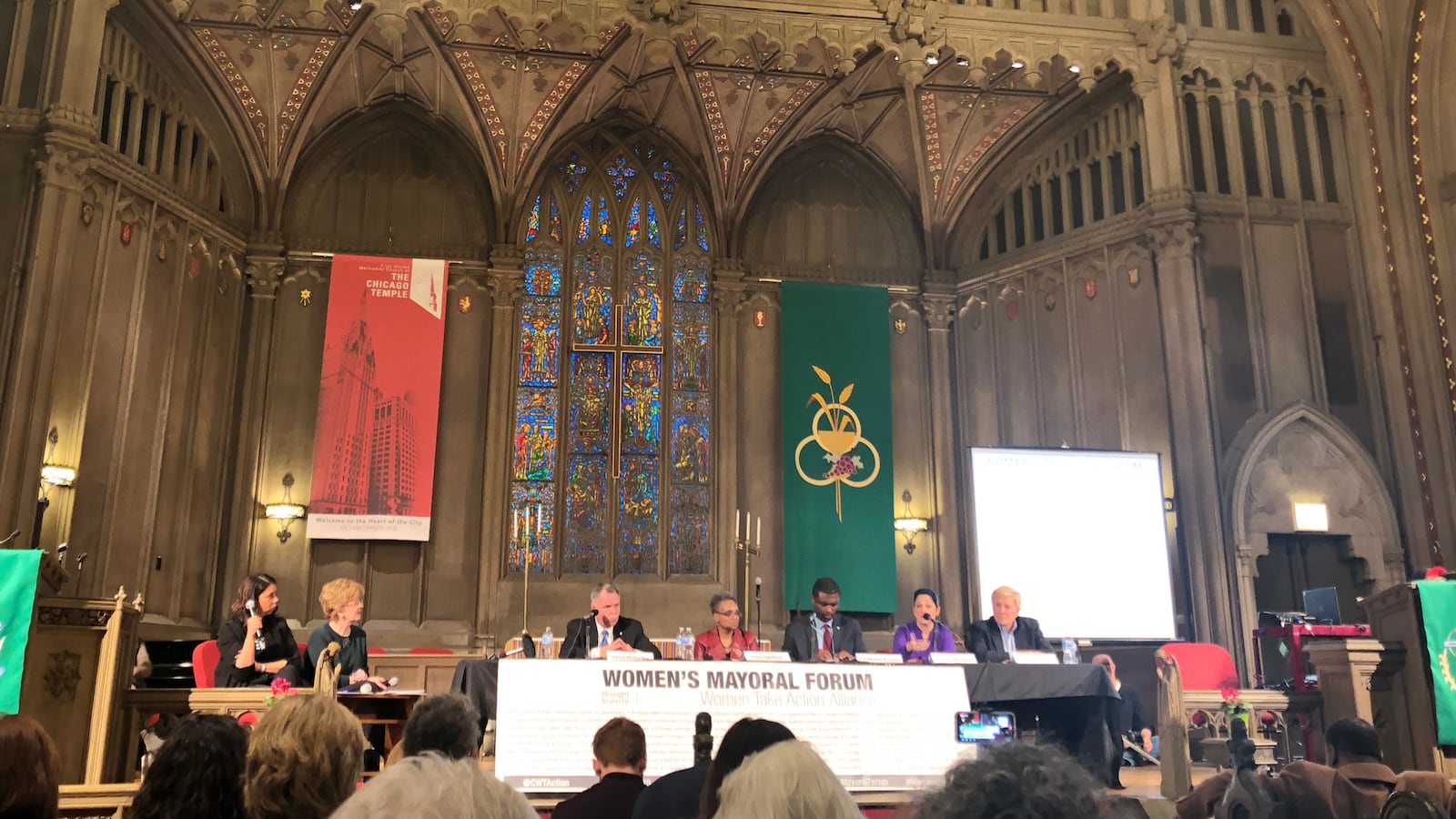Is Chicago’s “college or bust” culture undermining its neighborhood schools? At a forum on Saturday, several mayoral candidates pledged that, if elected, they would re-evaluate the selective enrollment, or test-in, model and steer more resources toward neighborhood schools and vocational programs.
Lori Lightfoot, a lawyer and former federal prosecutor, was among those pledging to “reorient” the Chicago school district’s approach. “The focus is so much on ‘college or bust’ and selective enrollment that we’ve gotten away from the core mission of making sure we have good quality schools everywhere,” she said.
An alliance of nearly 50 women’s groups sponsored Saturday’s forum, held at the Chicago Temple in the Loop and attended by 11 of the 15 mayoral candidates. Education was the first subject area addressed, but the event also covered economic development, crime, and gender equality. Candidates were divided into two groups for the interviews and not every candidate was asked every question.
Of the front-runners, only Bill Daley, the former U.S. commerce secretary and former Obama chief of staff, did not attend.
In the last few weeks of the contentious mayoral race, the topic of building up Chicago’s neighborhood schools has become a familiar theme. Neighborhood schools must accept any child living in their attendance boundary.
A new capacity report shows that 233 of the district’s schools are underutilized, according to a district formula; most of the schools on that list are open-enrollment schools.
In contrast, Chicago’s selective enrollment, or test-in, schools are among the top-rated and most in-demand programs. Federal civil rights data show that, as a whole, they tend to enroll more white students and, at the high school level, offer more AP and college-preparation courses than their neighborhood counterparts.
In addition, critics say, the district’s focus on test-in schools has been at the expense of neighborhood programs.
Illinois Comptroller Susana Mendoza said she’d boost neighborhood schools by explaining her 50NEW program, which would turn 50 under-utilized campuses into community centers, complete with robust after-school programs and job training classes for parents at night. She also pledged to “close the achievement gap by 50 percent.”
Mendoza said she’d pay for her initiative with extra dollars wrung from the state’s revamped education funding formula that netted hundreds of millions more for Chicago’s schools this year.
“We have stopped magnetizing our high schools,” said Paul Vallas, a former Chicago budget director and schools chief who has also led school districts in New Orleans, Philadelphia, and Bridgeport, Connecticut. “We need to put programs in our neighborhood high schools to make them attractive.”
The youngest candidate in the race, 30-year-old Chicago Public Schools graduate John Kozlar, took the most extreme position, saying he’d abolish the K-12 system and implement a K-10 system that would ask students to choose, after their sophomore year, a career track or a college track.
“We aren’t teaching our students about the trades. We’re telling them they have to go to college,” he said. “That’s a 20th century way of thinking.”
Gery Chico, a lawyer who worked in the Richard M. Daley administration and later served as Chicago school board president and state school superintendent, said he’d expand both vocational education and the academically rigorous International Baccalaureate program from “50 schools to 150 schools.” Several neighborhood schools offer IB tracks in addition to vocational programming to give students options; the district is currently offering its first request-for-proposals for schools that want to add IB and other enrollment-boosting curricula.
Chicago’s mayoral race is still largely unpredictable. Several of those considered front-runners have raised large sums of money but recent polls show that significant percentages of Chicago voters remain undecided.
Until recently, all but one of the candidates for Chicago mayor have skirted the question of whether they’d retain schools chief Janice Jackson if they are elected. Cook County Board President Toni Preckwinkle, who is among the front-runners and is backed by the Chicago Teachers Union, took a moment Saturday to lavish praise on the homegrown schools chief and touted the need for “stability” in the city.
“I have confidence in Janice Jackson,” she said, in response to a question that asked two candidates to evaluate the district’s handling of a sexual abuse scandal that reveals widespread policy lapses that date back decades. “She’s done a great job leading our public schools.”
In a recent Chalkbeat Chicago candidate questionnaire, only one, policy consultant Amara Enyia, answered “no” to the question of whether they’d retain the schools chief.

